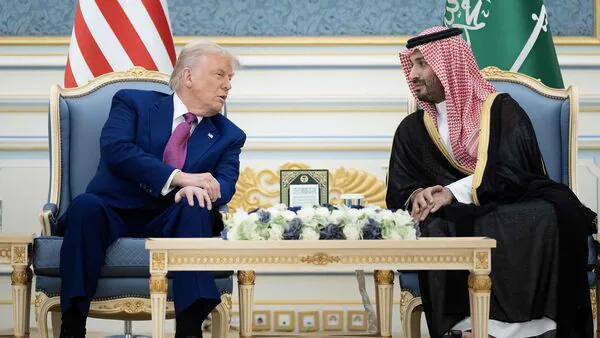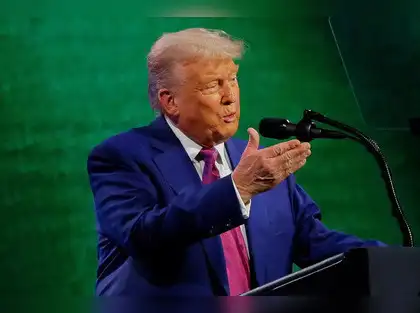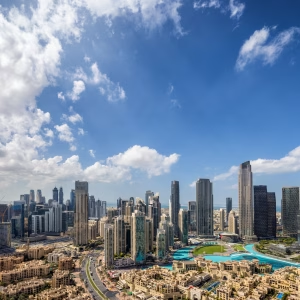Former U.S. President Donald Trump’s recent visit to the Middle East has made headlines for more than just political discussions. During his meetings with regional leaders and tech giants, a surprising development caught global attention — a major AI chip deal involving Nvidia, the world’s top AI hardware company.
While details are still unfolding, early reports suggest that this deal could change the region’s tech industry. For countries like the UAE, which have already invested billions into artificial intelligence, this move comes at a very interesting time.
So, what exactly happened during Trump’s visit, and why does it matter to the UAE?

A Game-Changing AI Chip Deal
Sources say that during Trump’s meetings, technology was one of the key topics of discussion. The spotlight quickly turned toward Nvidia, the California-based tech firm known for producing the most advanced AI chips on the planet. These chips power everything from self-driving cars to high-level robotics and deep learning systems.
Reports suggest that Nvidia has agreed to supply a significant number of AI chips to a coalition of Middle Eastern countries. While the U.S. has previously limited the sale of high-end chips to certain countries for security reasons, Trump’s involvement might have helped open new doors for deals to happen — possibly with more flexibility than before.
UAE’s Bold AI Vision Gets a Boost

The UAE has never hidden its ambition to lead in artificial intelligence. From launching a Ministry of AI to hosting global tech conferences and investing heavily in smart cities, the country is racing ahead to become a digital hub. With the introduction of cutting-edge Nvidia chips into the region, the UAE’s AI vision is likely to move even faster.
These chips could be used in a wide range of projects — from improving city planning with AI-based traffic systems to powering healthcare innovations like robotic surgeries or advanced diagnostic tools.
Political Influence Behind the Tech Curtain
While tech deals often seem purely business-oriented, Trump’s involvement highlights how politics still plays a huge role in shaping the future of technology. As a former president, Trump may not be in office, but his influence — especially in business circles — remains strong. His presence during the talks suggests that this wasn’t just another tech deal. It was a strategic move, possibly aimed at building stronger ties between the U.S., Nvidia, and Middle Eastern governments.
For the UAE, having closer ties with both a leading American tech company and influential political figures from the West strengthens its global position. It allows the country to play a more central role in future conversations about technology, trade, and even global data policies.
Why Nvidia Matters So Much
You might wonder, why is Nvidia such a big deal? Nvidia’s graphics processing units (GPUs) are not just for gaming anymore. They are now the engine behind almost every major AI system. Whether it’s ChatGPT-like models, AI in factories, or defense systems, Nvidia chips are essential.
Due to their limited global supply and high demand, getting access to these chips is not easy. Countries around the world are competing to secure them. That’s why a deal like this is seen as a huge win for the region — and especially for the UAE, which can now fast-track several of its AI projects.
Challenges That Come with Opportunity
While the deal is promising, it doesn’t come without its share of concerns. With more access to AI chips, countries must also build stronger regulations to avoid misuse. From privacy issues to cybersecurity threats, managing the risks of advanced AI systems is a complex task.
For the UAE, this means more than just having the technology — it also means training professionals, setting up ethical AI guidelines, and making sure systems are safe and transparent.
UAE’s Role in the Future of Global AI
If this deal moves forward as expected, the UAE stands to benefit in multiple ways. First, it may attract more global companies to set up shop in the region, boosting investment and job opportunities. Second, it positions the country as a testing ground for future AI products, especially in areas like transportation, finance, and healthcare.

The country’s current projects, like autonomous taxis, AI-supported education systems, and virtual health consultations, could all see massive improvements with the use of Nvidia chips.
And with Expo City Dubai being transformed into a smart city of the future, this new tech could be just what the country needs to stay ahead of global trends.
A Shift in Global Tech Power?
The bigger picture here is not just about one chip deal or one country. If the Middle East, led by forward-thinking nations like the UAE, starts gaining more access to AI hardware and expertise, we could see a shift in where the world’s top tech advancements come from.
For years, AI progress was largely centered around the U.S., China, and a few parts of Europe. But with the current momentum, the Gulf region could become a new center for innovation. This wouldn’t just change the economy — it could also impact education, defense, infrastructure, and even space exploration.
Final Thoughts: What’s Next?
Trump’s Middle East visit may have seemed like a routine diplomatic event at first. But behind closed doors, it might have unlocked a future where the UAE and its neighbors play a much bigger role in shaping the world’s tech future.
With Nvidia’s advanced chips and growing global influence, the UAE is well-placed to accelerate its national AI agenda. What remains to be seen is how this technology will be implemented — and whether the country can balance fast growth with responsible innovation.












